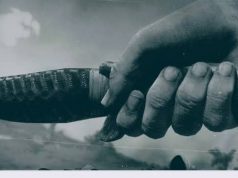
Justice John Tsoho of the Abuja division of the Federal High Court Tuesday, disqualified himself from the trial of suspected members of the Boko Haram sect over alleged bias.
The suspected terrorists are standing trial on 11 charges for allegedly kidnapping and murdering 11 foreign nationals between 2011 and 2013 in the northern part of the country.
They are Mohammed Usman (aka Khalid Albarnawi), described as leader of a Boko Haram splinter group, Mohammed Bashir Saleh, Umar Bello (aka Abu Azzan); Mohammed Salisu (Datti); Yakubu Nuhu (aka Bello Maishayi), Usman Abubakar (Mugiratu) and a lady, Halima Aliyu.
When the matter came up for trial, the suspects accused the judge of bias based on his order directing them to be detained in the custody of the Department of the States Security Service (DSS) rather than the initial order of the court that they be remanded in prison custody.
In his ruling on the request of the defendants for transfer of their case, Justice Tsoho disqualified himself from presiding over the trial.
The court held that since the suspects had alleged bias, the honourable thing to do “is to disqualify myself from hearing the case.
Justice Tsoho noted that the Boko Haram suspects allege bias and loss of confidence because of the order that they be kept in DSS custody against its earlier ruling.
Justice Tsoho who observed that his order of April 25, 2017 has not been appealed, however, withdrew from the trial.
“As admitted by the federal government’s lawyer, justice is rooted in confidence; the position taken by the affected defendants is very clear and fundamental in law” Justice Tsoho stated.
“In keeping with the demand of the suspects, this court is minded to disqualify itself from moving ahead with the trial.
“The case file will be returned to the Acting Chief Judge for re-assignment to another court” Justice Tsoho declared.
Justice Tsoho had on March 14, 2017, ordered that the defendants be remanded in Kuje prison custody.
Rather than obey the remand order made on March 14, the prosecution counsel returned to court with an application seeking Tsoho to vary his earlier directive.
After taking arguments from prosecution and defence lawyers, the court, on April 25, succumbed to the pressure of the federal government, and ordered that the defendants be kept under the custody of the Department of State Service.
Earlier, the affected defendants had informed the court that the 1st defendant had complained bitterly that he was unfairly treated under DSS custody, having been separated from his co-defendants.




